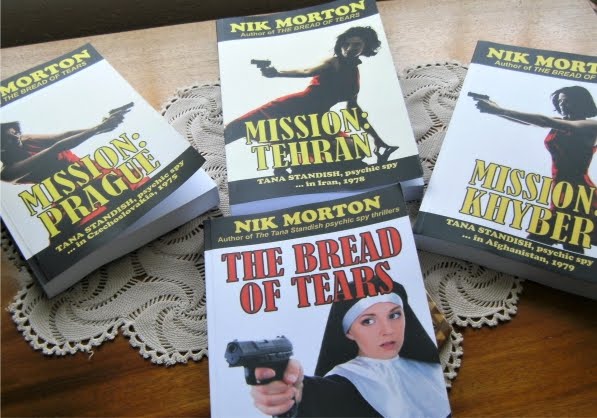There are a great many self-published books available these
days and, sadly, it’s obvious that they haven’t been edited, which often means
that a good story is diminished.
Authors definitely benefit by stepping back from their work
and appraising it with fresh eyes; the final author edit (self-edit) is vital. The temptation is there, but I’d
advise never to send off a book unless this final read-through has been done with a critical eye. I’ve seen and
rejected manuscripts where it was obvious that the author hadn’t re-read his
work but simply finished it and sent it off.
Still, as a book editor (as opposed to a commissioning
editor), I looked at work that had been accepted.
Obviously, a book editor is there to spot the inconsistent,
the illogical and the plain wrong items which the author couldn’t identify
because she was too close to the work. (That important step back didn’t occur,
perhaps?)
I believe that an editor can be of great help if he or she
reads widely, not simply in a narrow genre; indeed reading a variety of
non-fiction subjects too. It is a truism that is often ignored, but all writers
should read - and analyse books. Naturally, the majority should write within the
genre with which they’re familiar. True, accomplished authors are able to
switch genres with ease. I need to know enough about any given subject to ask
questions that a book’s potential readership might ask. Though in truth,
perhaps the author should have asked these questions at the writing stage, that
step back viewpoint again. Still, an editor can’t take it for granted that the
author has “got it right”, so there’s a need to check that the author’s
research is accurate.
The editor’s credo is “Do no harm” – harm is done by
altering the author’s style or the meaning of the prose.
Unlike short story writers, there’s a tendency to be verbose
where novels are concerned. Often, the same thing is said or described in more
than one way. Editors should emphasise economy of words: the writer saying as
much as she can with as few words as possible. (Did you notice that I said the
same thing twice in the previous sentence?) That makes the editor’s – and ultimately
the reader’s life easier.
Writers should always strive for clarity of understanding. And
of course it is the editor’s job to ensure that this is the case. If the editor
doesn’t comprehend the context, the visuals or the internal logic, then it’s
highly likely the reader won’t either.
Good writers appreciate intelligent editing; bad writers don’t like being edited.
There are bad editors around, too, naturally. This is the real world, after all.
An editor must fight the impulse to over-edit or rewrite. There’s nothing more dispiriting for a writer to find that the prose has been ripped to shreds, apparently without due explanation. However, showing respect to a difficult author can be a problem too. Authors can be demanding or even exasperating, rejecting out of hand even the smallest proposed changes. There is no such thing as precious prose. Balance and compromise are necessary at times.
I tended to begin a working relationship by proposing changes – usually in red on the electronic copy: spelling, punctuation and grammar corrections. In addition:
Offering alternative words;
highlighting duplication of a word or phrase, sometimes due
to the “echo effect”;
pointing out the generalisations (specifics are needed, not
generalisations);
identifying clichés, mixed metaphors and so on.
Spotting anachronisms, anomalies and logic lapses (we’re all
prone to these in some measure).
Making suggestions to improve the drama in a particular
scene.
Pointing out any excess of “tell” over “show.”
Promoting the writer’s visual sense (sketches of scenes can
help here).
All of the above list can be tackled in large measure by the author stepping back and doing that final self-edit. Still, the book editor is the last resort, where it is hoped the stumbles are identified and corrected. (Nobody’s perfect, however, so inevitably some annoying gremlins still do get past all those critical eyes!)
As can be seen from this brief glimpse, editing is perseverance
– refine, suggest and advise.
In the final analysis, the editor must appreciate that it is
the author’s book.
***
Please note that I am not currently seeking editing work.
I would recommend my guide below (but I would, wouldn't I?)
Please see Chapter 14
– Self-edit in Write a Western in 30 Days for details about what to look for
when doing that final self-edit.Please note that I am not currently seeking editing work.
I would recommend my guide below (but I would, wouldn't I?)



























4 comments:
Ideas worth poaching here,Nik. :-) Thank you and I do so agree that it's the author's job to do thorough edits of their work before passing the ms on. I've read a few stories recently, supposedly edited professionally by the publisher, which have been dreadful in places.(I'm NOT referring to my own publishers who are very thorough)I'm sure that in at least one of the novels I'm referring to that the author didn't bother/chose not to make time for the crucial last self-edits that were necessary.
Thanks, Nancy, and I agree. It's the slipshod that becomes annoying. Fine, none of us is perfect, but at least we should strive for (unattainable) perfection.
Good points here, Nik. Very helpful. Writers should look at their own work with a critical eye. It helps to have many different eyes on a project (critique partners or beta readers) as well as the author taking an objective look at everything. The editor is the final pass before publication. Obviously, no one is infallible, but let's hope most, if not all, the mistakes are caught in the full process.
Thanks, Marie. That's the hard part, authors being objective about their work. Necessary, though.
Post a Comment